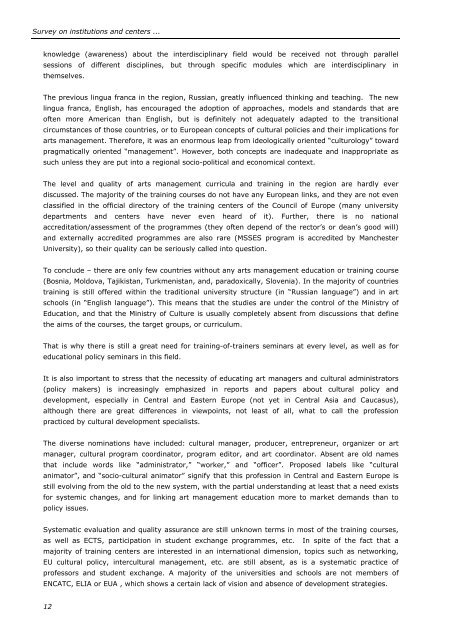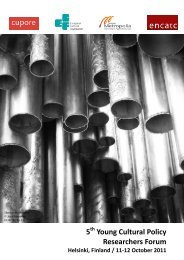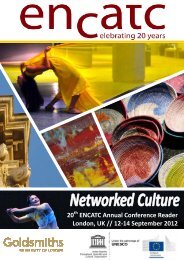Training in cultural policy and management: international ... - Encatc
Training in cultural policy and management: international ... - Encatc
Training in cultural policy and management: international ... - Encatc
You also want an ePaper? Increase the reach of your titles
YUMPU automatically turns print PDFs into web optimized ePapers that Google loves.
Survey on <strong>in</strong>stitutions <strong>and</strong> centers ...<br />
knowledge (awareness) about the <strong>in</strong>terdiscipl<strong>in</strong>ary field would be received not through parallel<br />
sessions of different discipl<strong>in</strong>es, but through specific modules which are <strong>in</strong>terdiscipl<strong>in</strong>ary <strong>in</strong><br />
themselves.<br />
The previous l<strong>in</strong>gua franca <strong>in</strong> the region, Russian, greatly <strong>in</strong>fluenced th<strong>in</strong>k<strong>in</strong>g <strong>and</strong> teach<strong>in</strong>g. The new<br />
l<strong>in</strong>gua franca, English, has encouraged the adoption of approaches, models <strong>and</strong> st<strong>and</strong>ards that are<br />
often more American than English, but is def<strong>in</strong>itely not adequately adapted to the transitional<br />
circumstances of those countries, or to European concepts of <strong>cultural</strong> policies <strong>and</strong> their implications for<br />
arts <strong>management</strong>. Therefore, it was an enormous leap from ideologically oriented “culturology” toward<br />
pragmatically oriented “<strong>management</strong>”. However, both concepts are <strong>in</strong>adequate <strong>and</strong> <strong>in</strong>appropriate as<br />
such unless they are put <strong>in</strong>to a regional socio-political <strong>and</strong> economical context.<br />
The level <strong>and</strong> quality of arts <strong>management</strong> curricula <strong>and</strong> tra<strong>in</strong><strong>in</strong>g <strong>in</strong> the region are hardly ever<br />
discussed. The majority of the tra<strong>in</strong><strong>in</strong>g courses do not have any European l<strong>in</strong>ks, <strong>and</strong> they are not even<br />
classified <strong>in</strong> the official directory of the tra<strong>in</strong><strong>in</strong>g centers of the Council of Europe (many university<br />
departments <strong>and</strong> centers have never even heard of it). Further, there is no national<br />
accreditation/assessment of the programmes (they often depend of the rector’s or dean’s good will)<br />
<strong>and</strong> externally accredited programmes are also rare (MSSES program is accredited by Manchester<br />
University), so their quality can be seriously called <strong>in</strong>to question.<br />
To conclude – there are only few countries without any arts <strong>management</strong> education or tra<strong>in</strong><strong>in</strong>g course<br />
(Bosnia, Moldova, Tajikistan, Turkmenistan, <strong>and</strong>, paradoxically, Slovenia). In the majority of countries<br />
tra<strong>in</strong><strong>in</strong>g is still offered with<strong>in</strong> the traditional university structure (<strong>in</strong> “Russian language”) <strong>and</strong> <strong>in</strong> art<br />
schools (<strong>in</strong> “English language”). This means that the studies are under the control of the M<strong>in</strong>istry of<br />
Education, <strong>and</strong> that the M<strong>in</strong>istry of Culture is usually completely absent from discussions that def<strong>in</strong>e<br />
the aims of the courses, the target groups, or curriculum.<br />
That is why there is still a great need for tra<strong>in</strong><strong>in</strong>g-of-tra<strong>in</strong>ers sem<strong>in</strong>ars at every level, as well as for<br />
educational <strong>policy</strong> sem<strong>in</strong>ars <strong>in</strong> this field.<br />
It is also important to stress that the necessity of educat<strong>in</strong>g art managers <strong>and</strong> <strong>cultural</strong> adm<strong>in</strong>istrators<br />
(<strong>policy</strong> makers) is <strong>in</strong>creas<strong>in</strong>gly emphasized <strong>in</strong> reports <strong>and</strong> papers about <strong>cultural</strong> <strong>policy</strong> <strong>and</strong><br />
development, especially <strong>in</strong> Central <strong>and</strong> Eastern Europe (not yet <strong>in</strong> Central Asia <strong>and</strong> Caucasus),<br />
although there are great differences <strong>in</strong> viewpo<strong>in</strong>ts, not least of all, what to call the profession<br />
practiced by <strong>cultural</strong> development specialists.<br />
The diverse nom<strong>in</strong>ations have <strong>in</strong>cluded: <strong>cultural</strong> manager, producer, entrepreneur, organizer or art<br />
manager, <strong>cultural</strong> program coord<strong>in</strong>ator, program editor, <strong>and</strong> art coord<strong>in</strong>ator. Absent are old names<br />
that <strong>in</strong>clude words like “adm<strong>in</strong>istrator,” “worker,” <strong>and</strong> “officer”. Proposed labels like “<strong>cultural</strong><br />
animator”, <strong>and</strong> “socio-<strong>cultural</strong> animator” signify that this profession <strong>in</strong> Central <strong>and</strong> Eastern Europe is<br />
still evolv<strong>in</strong>g from the old to the new system, with the partial underst<strong>and</strong><strong>in</strong>g at least that a need exists<br />
for systemic changes, <strong>and</strong> for l<strong>in</strong>k<strong>in</strong>g art <strong>management</strong> education more to market dem<strong>and</strong>s than to<br />
<strong>policy</strong> issues.<br />
Systematic evaluation <strong>and</strong> quality assurance are still unknown terms <strong>in</strong> most of the tra<strong>in</strong><strong>in</strong>g courses,<br />
as well as ECTS, participation <strong>in</strong> student exchange programmes, etc. In spite of the fact that a<br />
majority of tra<strong>in</strong><strong>in</strong>g centers are <strong>in</strong>terested <strong>in</strong> an <strong>in</strong>ternational dimension, topics such as network<strong>in</strong>g,<br />
EU <strong>cultural</strong> <strong>policy</strong>, <strong>in</strong>ter<strong>cultural</strong> <strong>management</strong>, etc. are still absent, as is a systematic practice of<br />
professors <strong>and</strong> student exchange. A majority of the universities <strong>and</strong> schools are not members of<br />
ENCATC, ELIA or EUA , which shows a certa<strong>in</strong> lack of vision <strong>and</strong> absence of development strategies.<br />
12






